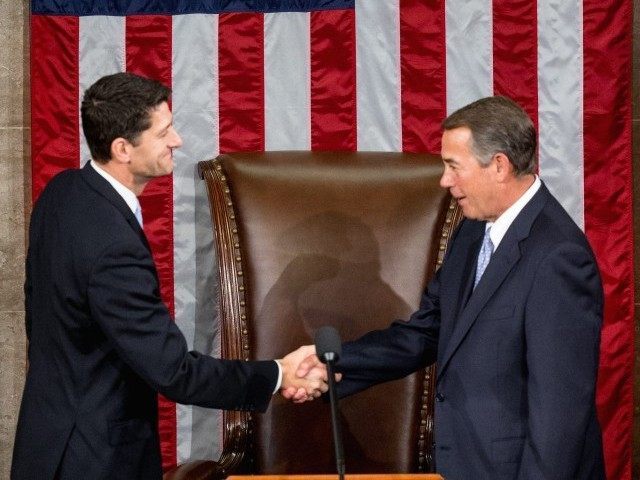Former Speaker of the House John Boehner has endorsed current Speaker Paul Ryan (R-WI) for president, in the event that no Republican candidate achieves a majority on the first ballot at the Republican National Convention in Cleveland in July.
Politico reports that Boehner, speaking at a conference in Boca Raton, Florida, said: “If we don’t have a nominee who can win on the first ballot, I’m for none of the above. They all had a chance to win. None of them won. So I’m for none of the above. I’m for Paul Ryan to be our nominee.”
Late Tuesday evening, as results from primary contests confirmed Donald Trump’s victories in four out of five states, CNBC reported that Ryan had not ruled out accepting such a nomination.
Ryan was welcomed by conservatives as Mitt Romney’s choice for running mate in 2012. The pro-life fiscal conservative had led the charge to reform entitlements, and used his policy prowess to point out the deep flaws in Obamacare during the intense debates of 2009-10.
In the aftermath of that 2012 loss, Ryan turned his attention to the task of governing rather than opposing, convinced that Republicans shared responsibility with Democrats and the president. As a result, he showed an openness to compromise on immigration and on budget issues that resulted in the erosion of some conservative support.
When Boehner resigned as speaker in 2015, however, Ryan remained the only candidate capable of pulling the fractious House majority together.
Both Trump and rival Sen. Ted Cruz (R-TX) have warned against a brokered convention.
Twice, Ryan has declined the opportunity to run for president on his own. But for Republicans frustrated with Trump’s success, and unwilling to accept Cruz as an alternative, Ryan is a possible Plan B.
A recent poll by the Democrat-aligned Public Policy Polling found Americans every divided, 38%-39%, over Ryan’s performance thus far as Speaker.
His favorability among Republicans has dropped significantly, from two-thirds to less than half, since he became Speaker, owing partly to his inclusion in the party “establishment,” and partly to his approval of budgets that raised spending and included funding for controversial programs.
Boehner has offered a “Plan B” before, in the context of debate in late 2012 over the “fiscal cliff” as the Bush tax cuts expired. His caucus rejected the plan.

COMMENTS
Please let us know if you're having issues with commenting.